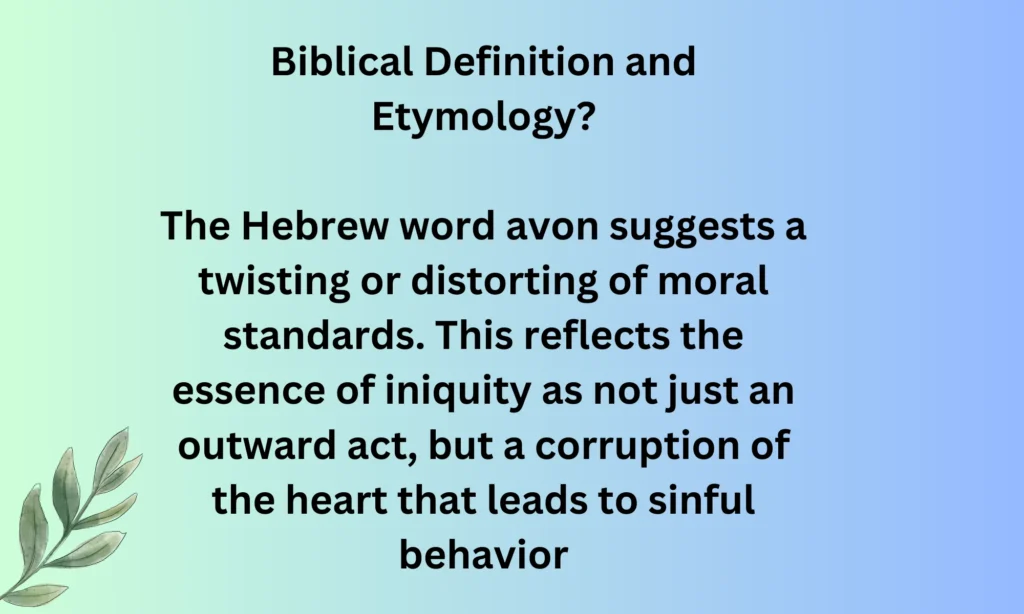Last Updated on October 22, 2024 by Ethan Richards
Iniquity is a term often used in biblical discussions, but what exactly does it mean? How does it differ from sin and transgression, and why is it significant in the story of redemption?
In this blog post, we’ll delve into these questions and provide a comprehensive understanding of iniquity in the Bible, exploring its deeper implications, historical context, and relevance to believers today.
This in-depth exploration will not only clarify the term but will also highlight how God’s plan of redemption is intertwined with the presence of iniquity.
Understanding the Essence of Iniquity
Iniquity is more than just sin; it’s a moral corruption that penetrates the heart. In biblical terms, it represents a deep-seated perversion or deviation from what is right.
In both Hebrew (avon) and Greek (adikia), the word for iniquity refers to injustice or wickedness—a state of inner corruption that leads to persistent unrighteous actions.
Biblical Definition and Etymology

The Hebrew word avon suggests a twisting or distorting of moral standards. This reflects the essence of iniquity as not just an outward act, but a corruption of the heart that leads to sinful behavior.
In the Greek New Testament, the term adikia describes unrighteousness or wrongdoing on a broader scale, often used to refer to behaviors that violate God’s justice.
Distinguishing Iniquity, Sin, and Transgression
While many people use the terms iniquity, sin, and transgression interchangeably, the Bible differentiates between them. Understanding these differences is crucial to comprehending the gravity of iniquity in a believer’s life.
Sin vs. Transgression vs. Iniquity
- Sin (hamartia in Greek) means “to miss the mark.” It describes failing to live up to God’s perfect standards (Romans 3:23).
- Transgression (pesha in Hebrew) refers to rebellion or intentional disobedience against God’s law (Psalm 51:1).
- Iniquity represents the internal crookedness that leads to both sin and transgression. It’s the corruption of character, often depicted as an inclination toward evil.
Iniquity as a State of the Heart
Unlike sin, which can refer to a single action, iniquity is the condition of the heart that fuels sinful behavior. Psalm 51:5 speaks to this truth: “Surely I was sinful at birth, sinful from the time my mother conceived me.
” Here, David refers to iniquity as an innate aspect of human nature, highlighting its pervasiveness.
Iniquity in Biblical Context
Old Testament Foundations
In the Old Testament, iniquity is often associated with disobedience and idolatry. The iniquities of the kings, such as Saul’s disobedience (1 Samuel 15) or Manasseh’s idolatry (2 Kings 21), led to national calamities and personal downfall. Iniquity was seen as a collective force that could impact entire generations.
- Saul’s Disobedience: God’s rejection of Saul as king is a direct result of his iniquity—he acted out of pride and ignored God’s clear commands.
- Manasseh’s Idolatry: Manasseh’s reign marked one of the darkest periods in Judah’s history due to his widespread promotion of idolatry and injustice, which God condemned as iniquity.
New Testament Teachings

In the New Testament, Jesus and the Apostles focused on the inner condition of iniquity and its ramifications for salvation. Jesus warns of those who perform deeds in His name yet are full of iniquity: “Depart from me, you workers of iniquity” (Matthew 7:23, KJV). The Apostle Paul warns that the mystery of iniquity is at work, opposing God’s plan until Christ returns (2 Thessalonians 2:7).
Ancestral Sin and Individual Responsibility
The Bible teaches that iniquity can be passed down through generations, yet every person is individually accountable for their actions. This concept is deeply rooted in biblical justice.
Ancestral Iniquity
Verses like Exodus 34:7 describe God “visiting the iniquity of the fathers upon the children and the children’s children to the third and the fourth generation.” This emphasizes the impact of ancestral iniquity—sins committed by previous generations can affect descendants.
Individual Accountability
However, Ezekiel 18:20 clarifies that each person is responsible for their own sin: “The soul who sins is the one who will die.” This verse reassures that, while iniquity may run in families, individual repentance and responsibility are always possible.
| Generational Iniquity | Individual Responsibility |
| Iniquity can influence future generations (Exodus 34:7) | Every person is responsible for their own sin (Ezekiel 18:20) |
| Patterns of behavior may be inherited or learned | God judges each individual based on their own choices |
Divine Forgiveness and the Erasure of Iniquity
God’s mercy offers a powerful remedy to iniquity. The Bible teaches that God is willing to forgive and erase iniquity when people genuinely repent.
God’s Mercy and Forgiveness
The promise of divine forgiveness is a cornerstone of Christian faith. Isaiah 43:25 declares, “I, even I, am he who blots out your transgressions, for my own sake, and remembers your sins no more.” Similarly, Micah 7:19 speaks of God’s desire to cast iniquities “into the depths of the sea.” These metaphors express God’s willingness to completely erase iniquity from His memory.
Your next verse awaits—discover powerful Bible truths on our Home Page now or read more articles for deeper insights
Christ’s Sacrifice as Atonement
The most profound act of forgiveness is through Christ’s sacrifice, which addresses the root of iniquity. Isaiah 53:5-6 prophesies about Jesus, stating that “He was pierced for our transgressions, He was crushed for our iniquities.” Christ’s suffering and death serve as the ultimate atonement for iniquity, offering believers the opportunity to be freed from its bondage.
The Gravity of Iniquity in the Narrative of Redemption
Iniquity and the Fall of Man

The narrative of iniquity begins with Adam and Eve’s fall in the Garden of Eden. Genesis 3 records the moment when iniquity first entered the human heart, leading to rebellion against God’s command and resulting in separation from God.
God’s Plan of Redemption
Despite humanity’s fall into iniquity, God’s plan of redemption unfolds throughout the Bible. From the promises made to Abraham to the prophetic declarations about the coming Messiah, the Bible consistently points to Christ’s redemptive work as the solution to iniquity. Romans 5:12-21 contrasts Adam’s act of disobedience with Christ’s act of obedience, which makes eternal life possible.
The Mystery of Iniquity in the Bible
The mystery of iniquity is a concept mentioned by the Apostle Paul in 2 Thessalonians 2:7, referring to a hidden force of evil working against God’s purposes in the world.
Unpacking the Mystery
This mystery is linked to the future rise of the Antichrist and the ultimate opposition to God’s rule. Iniquity, though restrained for a time, is a persistent force that will culminate in widespread rebellion before Christ’s return.
Historical and Eschatological Perspectives
Historically, iniquity has manifested in various forms of lawlessness and moral decay. Eschatologically, the Bible predicts that iniquity will intensify in the last days, culminating in the Antichrist’s reign of deception and rebellion. Matthew 24:12 warns that “because of the increase of iniquity, the love of many will grow cold.”
The Mystery of Iniquity and God’s Sovereignty
God’s Ultimate Control
Even though iniquity exists, God remains sovereign. Throughout history, God has used iniquity to accomplish His purposes. Romans 8:28 reminds believers that “in all things, God works for the good of those who love Him,” including in situations where iniquity seems to dominate.
Hope Amidst Iniquity
Though iniquity can seem overwhelming, believers can have hope in God’s sovereignty. The Bible is full of examples where God brings redemption out of situations of great iniquity, such as Joseph’s rise to power despite his brothers’ betrayal (Genesis 50:20).
Lessons About the Mystery of Iniquity for Christians Today
Discernment in a Lawless Age
Christians are called to stay vigilant in an age where iniquity is rampant. Paul’s exhortation in Ephesians 6:12 highlights the spiritual nature of the battle against iniquity: “For our struggle is not against flesh and blood, but against…the spiritual forces of evil.”
Maintaining Spiritual Integrity
To combat the influence of iniquity, believers must remain steadfast in their faith and live with integrity. Practices such as prayer, studying Scripture.
Conclusion
Iniquity in the Bible refers to the deep-rooted, intentional rebellion against God’s will, often manifesting as sin that goes beyond mere wrongdoing.
Understanding iniquity is crucial for grasping the broader narrative of redemption and God’s plan for humanity. Throughout Scripture, iniquity is highlighted as a barrier between humanity and God, one that requires divine intervention for restoration.

Justin Taylor is a gifted storyteller and dream analyst who brings a fresh perspective to biblical dream interpretations. His engaging narratives and intuitive insights captivate readers, guiding them through the intricate tapestry of their subconscious mind.








